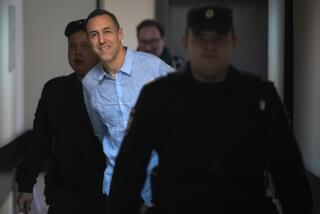Claims in arms case stir up French
PARIS — Convicted of profiting from illicit arms sales to Angola, a former French interior minister is roiling the political establishment by accusing other officials of knowing about the deal and demanding that the government open secret files to prove him right.
Charles Pasqua, the former minister who now is a member of France’s Senate, and Jean-Christophe Mitterrand, son of a former president, were among 36 people found guilty Tuesday of knowingly profiting from or facilitating the unauthorized $790-million sale in the 1990s.
Pasqua, 82, was sentenced to a year in jail, fined $148,000 and given an additional two-year suspended sentence. Mitterrand, son of former President Francois Mitterrand, was given a two-year suspended sentence and fined $550,000.
Pasqua, a conservative, claims that other government officials, including presidents Mitterrand and Jacques Chirac, also knew about the arms deal. He is appealing the verdict and demanding that Chirac’s successor, current President Nicolas Sarkozy, open secret government files to reveal all of France’s arms transactions.
He and other defendants have long said the French government knew about the arsenal of weapons sold to Angolan President Jose Eduardo Dos Santos to aid a 27-year war against UNITA rebels, a conflict in which an estimated half a million people died.
Judges in the case said other French officials probably did know, but that did not affect their verdict.
The two men accused of sending the Soviet-made arms to Angola received six-year prison sentences.
France officially rejected Dos Santos’ request to buy weapons because of a United Nations embargo, making it illegal to traffic in arms through a French intermediary without government permission.
Playing on the sentiment of many here who believe government dealings are largely corrupt, Pasqua told French RTL radio Wednesday that while he was interior minister, “a lot of money circulated with the sale of weapons and diverse material. People are mean, and there are a lot of comments and rumors, so it’s best that it be clarified,” he said.
Experts say it is unlikely defense secrets will be made public. But Pasqua’s request has gathered steam among politicians appealing for more transparency.
“There are too many suspicions . . . all that has poisoned for years French political life,” said Francois Bayrou, a former presidential candidate and leader of the centrist Democratic Movement party. He said defense secrets should be made public, and said he would advocate for a parliamentary commission to better communicate what can be said about foreign and domestic politics.
Last week, a trial concluded against former Prime Minister Dominique de Villepin, who is among a group accused of creating a bogus list of figures who allegedly pocketed illegal kickbacks. Sarkozy, De Villepin’s political rival, was placed on the list. A verdict is expected in early 2010.
Members of parliament from the opposition Socialist Party drafted a petition in support of Pasqua’s demand.
“It is time to change eras, and the president of the republic, Nicolas Sarkozy, who promised ‘a rupture’ [with the past], must respond positively,” it said.
Jean-Vincent Brisset, international relations and defense expert at the French IFRI think tank, said French weapons sales were already conducted through a “pretty open process” run by a commission that cannot operate alone.
--
Lauter is a special correspondent.
More to Read
Sign up for Essential California
The most important California stories and recommendations in your inbox every morning.
You may occasionally receive promotional content from the Los Angeles Times.








